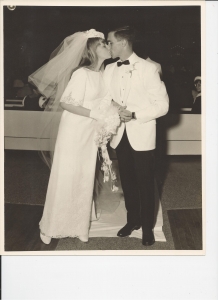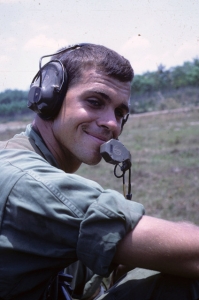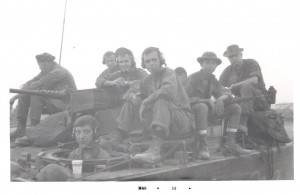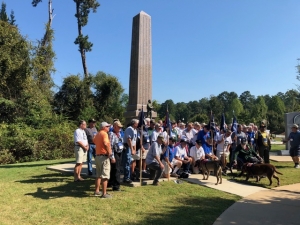May 17, 2019, marks the 50th anniversary of the death Captain David R. Crocker, Jr. in Vietnam. We were married on June 9, 1966, the day after his graduation from West Point.

Each year, remembering his death on this date reverberates through whatever I’m doing. This “anniversary” is the only aspect of the experience of his loss that feels anchored in time. Each year I note the weather, then and now, and who I am, presently. I remember that in 1969 it was finally becoming spring-like and trees were blossoming, although it had been chilly in the northeast like this year. By Memorial Day, when his funeral was held, we were jettisoned into summer with temperatures in the 90s. My great-uncle wore a black suit and passed out from the heat when we gathered in the cemetery. I would have liked to have shared my secret then with Uncle Ephraim that Dave wasn’t really being buried that morning. Perhaps he wouldn’t have collapsed from sadness and the sun. Only our letters and other memorabilia were in the coffin. Dave’s sister and I would take his ashes to the Eiger in Switzerland later that summer. It was my attempt to control uncontrollable events.

Capt. David R. Crocker, Jr. in Vietnam, 1969
I remember the commencement of disbelief and grief back then as I reabsorb the chain of events from long ago; the notification, the decisions, the identification of the body, the acceptance that it had really happened. Each year since, at this time, I pay more attention than usual to my life navigation and where I’ve sailed since that bolt of catastrophe. I went to Vietnam this year in February to see the country for myself. My visit didn’t change anything for me but I’m glad I had the courage to go. The heat was intense and the scorching sun was the one element I remember from his letters.
The most important thing I’ve done in the fifty years since his death is to try to understand the experience of war and loss by writing about it. Richard Hoffman says, about writing difficult stories, that you can never entirely redeem the experience, but you can make it beautiful (human) enough that there is something to balance it. When we restore balance, we integrate our experience and find our own truth. It becomes manageable, even coherent. Writing about this tragedy caused me to dig into understanding who I was when I married at age nineteen and how I managed the unexpected catapult into widowhood at twenty-two.
And when we tell our stories we discover others with important stories.
Among the blessings I have received over the years are my friendships with the men of A Co 2/22 Infantry who served with Dave and also hold him in their hearts. They have helped me immeasurably by sharing their memories with me at reunions over the past fifteen years. They tell stories that help me continue to feel the presence of Dave in the world. I’m not sure if time actually heals wounds, but it definitely provides opportunities to understand the wound better. Today and always, I give thanks for the healing effects of time – and good people who are willing to share their stories.
For more stories, visit Ruth at www.ruthwcrocker.com.

Members of the 22nd Infantry Regiment, National Infantry Museum at Ft. Benning in 2018
Ruth W. Crocker is the author of Those Who Remain: Remembrance and Reunion After War.


Dear Ms. Crocker,
Today I sent a previous email about your solemn article about nurses in the Lyme Times that I read with pleasure. I am sending it to all the nurses I know and hold in dear respect for their service.
I explain in the article attached and written about me but really our Lyme-Old Lyme VFW main mission which is aiding Vets in Need with temporary assistance services. Given your writing and publishing, you contacts may include men or women or their immediate families we may assist in SE CT. I also attach the list of services provided to date. Please let us know if you have such contacts. We are ready to serve.
VFWVetInNeedNU 3.jpeg
VFWVetInNeedNU 1.jpeg
Spending Log (Purpose/Date/Amount) Page 2 of 2
Sisk/support 5/5/12 $ 500.00
Clark/Furnace 7/7/13 $ 1,000.00
Tupper/Donation to fund 8/8/13 $ 1,000.00
Faust/Casey education/home 8/10/13 $ 1,200.00
Oakes/Propane 8/10/13 $ 745.05
Rose/Propane/All Pro car fix 12/12/13 $ 1,216.50
Starr/Big y/Gas card 12/12/13 $ 400.00
Vidou/Oil and lien payment 6/6/14 $ 1,468.13
Misheloff/Clothing 8/8/14 $ 97.20
Misheloff/Meal 9/8/14 $ 8.99
Burkes/Vet aid/assistance 12/12/14 $ 850.76
Vidou Funeral Expenses 2/10/15 $ 1,000.00
Welles/Rent,electric,food 4/4/15 $ 1,360.90
Phil Carrier/rent 6/10/16 $ 2,361.64
VistaPrint/St John Solicitation 7/16/16 $ 349.32
Welles/gas card 7/16/16 $ 50.00
Carrier food gift card 7/16/16 $ 250.00
Westbrook Vet wheel chair 8/10/16 $ 259.44
Vet entry ramps 9/10/16 $ 237.81
Vet Electric Bill for Morriss in New Haven 9/15/16 $ 300.00
Housing starter kits for vets 10/2/16 $ 435.38
Wiggins Rent 11/12/16 $ 250.00
Vet Home Depot Card 11/11/16 $ 750.00
St John Art show material for Vet 12/15/16 $ 256.38
Wheel Chair Batteries 1/23/17 $ 187.18
Vet Sarah W. Children Lunch Payment 2/15/17 $ 540.00
Vet Sarah W. Comissary food gift card 2/15/17 $ 200.00
Outreach for AF Vet (car,oil,medical) 3/31/17 $ 1,259.55
Vet in Need Wheel Chair Ramp 6/26/17 $ 1,500.00
Vet Public Transportation Tickets 6/26/17 $ 86.00
Gutter Repair for a Vet 8/23/17 $ 180.00
Driving Course for Vet Keith 9/15/17 $ 150.00
Transportation Tickets for Keith 9/15/17 $ 50.00
Vet Brennen Car Purchase 10/2/17 $ 750.00
Vet Tann New Apartment Lease 10/2/17 $ 1,000.00
Vet GA License Renewal 10/30/17 $ 200.00
CT Vehicle Registration for Brennen Car 10/30/17 $ 202.68
Brennen vehicle towing 10/30/17 $ 50.00
Brennen vehicle brake repair 11/4/17 $ 300.00
VetBus transportations tickets 11/27/17 $ 36.00
Vet Mattress and Box Spring 11/27/17 $ 341.13
Stop payment on ck3120 for Compton Rent 12/21/17 $ 20.00
Rent payment for vet Williams 12/18/17 $ 900.00
Car repairs for vet Harris 12/18/17 $ 1,481.89
Bus tickets and fax for vet Williams 12/18/17 $ 38.13
Poquonock Village apts rent for Wiech 12/22/17 $ 728.00
January Rent for Williams 1/13/18 $ 650.00
All Pro for car diagnostic for vet 1/24/18 $ 198.31
Keith H bus tickets 1/29/18 $ 36.00
Keith H Microwave 1/29/18 $ 31.91
Savior Septic invoice 1637 for vet Don C 5/1/18 $ 500.00
Don C Plainfield Vet improvements 5/1/18 $ 500.00
Oil for Vet Randy 5/7/18 $ 400.00
Rent and Security deposit for vet Joe 5/8/18 $ 1,450.00
Rent David R. at StoneCrest Towers 6/12/18 $ 776.00
Keith train/bus tickets 7/12/18 $ 72.00
Vet Moses food, insurance and utility bills 7/24/18 $ 245.10
Robert B rent 8/12/18 $ 1,400.00
Keith H bus tickets 8/24/18 $ 36.00
Keith H bus tickets 9/24/18 $ 36.00
Rent Deposit for Andy M 9/24/18 $ 925.00
Wheel Chair Rental for Vet Church Services transp1.0/22/18 $ 100.00
Purchase car for JeanC 10/26/18 $ 1,000.00
Bus tickets for KeithH 12/5/18 $ 36.00
Vet Ettorea garage door openers 12/31/18 $ 246.93
Guillory car and associated costs, gift cards 2/8/19 $ 3,385.01
Ettore garage door extra remote 2/8/19 $ 30.84
Ettore garage door installation 2/8/19 $ 32.00
Cash to vet Latoya (Shyloski) 3/28/19 $ 80.00
Vet car evaluation payment to AllPro via Fiedler 6/14/19 $ 252.85
Car purchase from AllPro for vet 6/28/19 $ 2,250.00
Car purchase from William Sawchuck for Terry B. 7/26/19 $ 600.00
Car Purchse Power of Attorney for 6/28 purchase 8/26/19 39.99
Oscar B pads and depends 8/28/19 271.68
Refuge Family resettlement contribution 10/1/19 250
2
Truck Repair for Vet 11/6/19 1494.83
Vet Orriss vehicle repair 1/23/20 $ 2,000.00 Total Spent $ 45,874.51
Balance $15,069.74
The Real Person!
The Real Person!
Dear Ed,
Thank you for all you are doing for those in need. You are a blessing to the community. Ruth